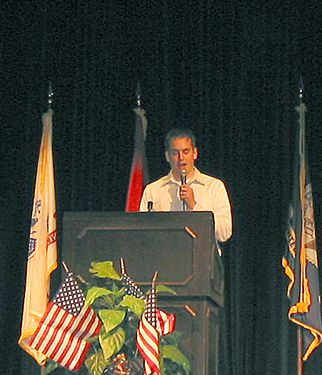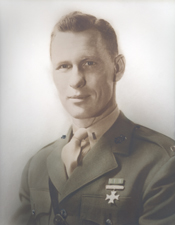 |
jacklummus.com Home Page Search Contact Us Site Map
Click the <Back> arrow to return to the previous page.
Chad Colston
Ellis County Veterans Appreciation Day, Saturday, November 12, 2005
 |
Reading the Jack Lummus Story
We were marines by Perry Giles
My name is Andrew Jackson Lummus, Jr. My friends call me Jack. I was born on a cotton farm in southeast Ellis County near the town of Alma. Growing up, I spent most of my time in and around Ennis.
My parents taught me the value of hard work and to respect all other people. I lettered in track and football at Ennis High School playing for the Lions, earning All-District honors in my sophomore and junior years. But I missed my senior year, being really sick with the flu and pneumonia.
After regaining my health, I accepted a two-year scholarship to play football at the Texas Military College in Terrell. Folks say that I was a pretty good athlete; I reckon that’s so, because after junior college, I received an athletic scholarship to play baseball and football for Baylor University, where I earned All-Southwest Conference honors. I was better at playing centerfield than I was at anything else.
After my college days, I moved on up to play football in the NFL for the New York Giants. We won the Eastern Division in 1941, and I played end in the NFL Championship game against the Chicago Bears at Wrigley Field on December 21st, just two weeks after the attack on Pearl Harbor.
After that Championship game, it just didn’t seem like that I should go on playing football while the rest of the country was volunteering for war. I came home to Texas and enlisted in the Marine Corps Reserve in Dallas on January 19, 1942. They assigned me to active duty and immediately shipped us out for San Diego on board a train.
Later on, I trained to be an officer at Quantico, Virginia. That was another twenty weeks of tough training.
I joined the Marine Raiders in June of ’43, but our unit was dissolved before we were ever deployed overseas. Then I was assigned to the newly created 5th Marine Division at Camp Pendleton, California.
While on liberty in early February ’44, I met a girl on a blind date in Los Angeles. Her name was “Skipper” (Bookwalter) and it was pretty much love at first sight.
We agreed to be married when I returned home from the war. My commanding officer agreed to be the best man.
In October of ’44 we shipped out for Hawaii, where we trained and made preparations for a major beach assault. We had no way of knowing at the time, but our 5th division was headed for a date with destiny on a little rock in the middle of the Pacific Ocean.
In January of ’45 we boarded the attack transports and sailed for Eniwetok and then on to Saipan. We had a one-day invasion rehearsal off the coast of Tinian. Then we got the word; we were going to take the volcanic island called Iwo Jima.
A few minutes after H-hour on February 19th, we landed on Red Two Beach in the first wave of assault troops. For the first several days of combat, I served as the liaison officer between our battalion and the one fighting on our right. After nine days, we were withdrawn from the front line and assigned to patrol and defend around Mount Suribachi.
On March 4th, my battalion was sent back to the line and due to the heavy casualties among our officers I was assigned as platoon leader of 3rd Platoon, Company E, 27th Marines. We were going to make a major push against the enemy positions. Our flyboys in the Air Force needed the airfields on this stinking island, and the time had come for us to take them.
The ground that we had to take was jagged, broken ground, badly chopped up terrain. It was well defended by Japanese fighting from well-concealed bunkers and emplacements. We used flamethrowers, bazookas, rifle teams and demolition teams. The fighting was bitter. Casualties were high and our gains were small.
The Japanese were on the high ground above us, and they just poured down mortar fire, grenades and sniper fire on us. On the 6th of March, we had 115 casualties and then on Wednesday the 7th, it was just a bloodbath, our losses were terrible.
At night they tried to infiltrate our positions. There was no rest after dark, only terror, and often times there was hand-to-hand combat.
Early on March the 8th, we moved forward behind our advancing tanks. Slowly forward we crept toward the enemy defenses on the rocky ledges and interconnected caves and tunnels that were up above us.
Then suddenly the Japanese opened fire on us from all directions. We had just by-passed many of them that were hiding underground in spider-traps. We were mixed up with them; there were grenade battles going on all around, some within 15 or 20 feet of the enemy.
I headed up the hill leading my platoon; we gained 150 yards, and then suddenly were stopped by a tremendous concentration of enemy fire. The platoon took cover as automatic fire raked our position. You could hear the sound of bullets zipping past us, just over our heads. Bullets cracking into the ground sent volcanic sand flying all over us. The men were pinned down, frozen and scared.
Now we were in a desperate situation. In the noise and confusion, I could make out several enemy pillboxes that were firing on us from different directions. It was plain to me that ordinary fire and maneuver methods would not work. I saw that I had to get out front and lead. There was no other way for us to get out of this mess.
After eyeing the pillbox that was closest to us, I jumped up and moved forward into the open, relying on my speed to dodge the Japanese fire. Just then, a grenade went off right beside me and I was knocked to the ground by the explosion. After I realized that all the shrapnel had apparently missed, I jumped up and ran to side of the concrete emplacement, stuck my carbine muzzle into the opening and fired away at them as fast as I could.
Before they could recover, I shoved a couple of grenades in through the opening and rolled over to take cover. The explosion blew rocks, sand and debris all over the place. By the time the smoke started to clear, another Japanese pillbox was firing at me. I couldn’t stay here, out in the open, so the only thing I could see to do was to charge the next one.
Another explosion went off just next to me, another grenade I think. Again I was knocked off my feet. This time there was a burning hot feeling in my shoulder, something had hit me for sure, but I didn’t want to stay down long. That would only give them a sitting target. There was no time for my wound; I had to stay on the move.
I got some more grenades ready and made a run for the second pillbox. Firing away as I charged, when I reached the concrete, again I fired my carbine in through the opening and rolled my grenades inside. The muffled explosion blew fire and debris out through all the openings.
Then I made my way back down to my platoon and went to each of them, giving directions and encouragement. All the boys got up and we advanced together, back up toward the dug in Japanese. Our attack slowly made progress to the Northeast as the men gained in confidence.
The flame-throwing tanks moved up to support us as much as they could, and the engineers were moving up to help as well. Just then another camouflaged bunker opened fire on us. Without delay I charged up the side of it and gave them the same treatment as the other two before. After my grenades silenced the enemy inside, I got up and waved my men forward.
Slowly but surely, we were killing off the enemy one by one, two by two in their foxholes, trenches and their spider-traps. The men were growing in determination as we gained in momentum. We continued uphill, fighting from one foxhole to the next. I stayed out in front, supervising the advance and shouting out for everyone to follow me.
I cleared out a foxhole and was advancing on the next. My platoon was just about to breach the Japanese line, when… My foot came down on something that clicked… A blinding flash of red light was followed by a deafening roar of explosion, and a blast of white-hot suffocating air went up. There was a dark cloud of volcanic ash and flying rocks that fell silently for nearly a minute.
As I gained visibility, I could see my men in the distance. I struggled to rise but could not. Then I looked down and saw white bone where my legs should be. My legs were gone! I lay back down for just a moment and then rose up on my elbows and shouted to the men, “Don’t Stop Now, Keep Going!”
They did just that. Those boys got up and charged past me right up the ridge, a bunch of ordinary men turned into unrelenting selfless warriors. I was proud of them, all of them.
As the Doc began to work me over, I told him “It looks like the Giants just lost a mighty good end today.”
It was the 8th of March 1945, a Thursday, and I was only 29 years old.
Remember us, for we were Marines once and young.
 |
1st
Lt. Jack Lummus was posthumously awarded the Congressional Medal of Honor. He
was one of two players from the National Football League to be awarded the
nation’s highest award.
| A |
Veterans Appreciation Day 2005
The above story appeared in the Waxahachie Daily Light during the week of Veterans Day.
*Editor's note: Perry Giles, in his unforgettable way, has given voice to many of our local fallen heroes. Through countless hours of research and interviews with family members and friends, he pieces together the events, thoughts and feelings of those who have sacrificed everything so that we may live in peace and freedom.
*Ennis Daily News
The story is courtesy of Perry Giles, Giles Monument Company, Waxahachie, Texas.
A shortened version of the newspaper article was read at the Ellis County Veterans Appreciation Day ceremony.
Click the <Back> arrow to return to the previous page.
© 1999-2007 Utility Press Inc. All rights reserved.